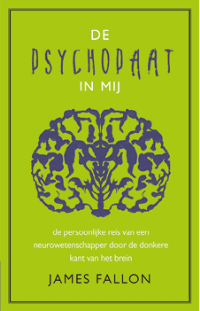zondag 16 november 2014
zondag 26 oktober 2014
zaterdag 23 augustus 2014
De psychopaat in mij - James Fallon
Heleen Croonen @medischcontact 13 augustus 2014
 Aan belangstelling geen gebrek voor het boek De psychopaat in mij van neurowetenschapper James Fallon. Schrijfster Saskia Noort wijdt een van haar fragmenten aan het boek tijdens het drie uur durende Zomergasten-interview op 3 augustus. Het hele verhaal begon tijdens een hersenonderzoek naar de ziekte van Alzheimer, waarbij Fallon zijn eigen scan en die van zijn familieleden als controles gebruikt. De schrik is groot als hij geen geschikte controle blijkt te zijn. Zijn hersenen lijken op die van iemand met een antisociale persoonlijkheidsstoornis door de kenmerkende verminderde activiteit in de orbitale, ventrale en temporale gebieden. Zijn genen wijzen vervolgens ook die kant op.
Aan belangstelling geen gebrek voor het boek De psychopaat in mij van neurowetenschapper James Fallon. Schrijfster Saskia Noort wijdt een van haar fragmenten aan het boek tijdens het drie uur durende Zomergasten-interview op 3 augustus. Het hele verhaal begon tijdens een hersenonderzoek naar de ziekte van Alzheimer, waarbij Fallon zijn eigen scan en die van zijn familieleden als controles gebruikt. De schrik is groot als hij geen geschikte controle blijkt te zijn. Zijn hersenen lijken op die van iemand met een antisociale persoonlijkheidsstoornis door de kenmerkende verminderde activiteit in de orbitale, ventrale en temporale gebieden. Zijn genen wijzen vervolgens ook die kant op.
Fallon ging te rade bij vrienden en familie, en zijn vrouw zei: ‘Je hebt aardig wat slechte gewoonten, maar je bent geen psychopaat.’
De neurowetenschapper vermoedt dat hij dankzij zijn liefdevolle opvoeding toch een gelukkig getrouwde huisvader met drie kinderen is geworden. De TED-talk die hij hierover in 2009 hield (zie hieronder), genereerde veel media-aandacht, en nu is het boek er in Nederlandse vertaling. Fallon hoopt dat zijn boek en zijn onderzoek helpen om mensen met een dergelijke aanleg toch op het rechte pad te houden, en vermoedt dat ze de samenleving dan echt verrijken.
TED-talk James Fallon:
≈TED-talk James Fallon:
TV interview met James Fallon n.a.v. zijn boek:
Labels:
nature,
neuroimaging,
nurture,
psychiatrie,
psychopathie
zondag 6 juli 2014
zaterdag 19 april 2014
Automobilisten met ADHD rijvaardiger door medicatie?
Unmedicated ADHD Patients: Accidents Waiting to Happen?
Fran Lowry
January 30, 2014
Could patients diagnosed with attention-deficit/hyperactivity disorder (ADHD) who are prescribed
ADHD medications but who drive without them be a danger to themselves and others when they drive?
ADHD medications but who drive without them be a danger to themselves and others when they drive?
New research from the Karolinska Institutet in Stockholm, Sweden, suggests that this may be the case.
According to the results of a large registry study, ADHD is associated with an increased risk for
serious transport accidents, a risk that might be reduced by ADHD medication, at least among men.
serious transport accidents, a risk that might be reduced by ADHD medication, at least among men.
"Studies have shown that ADHD is associated with serious transport accidents, but it is unclear
whether ADHD medication reduces this risk," senior author Henrik Larsson, PhD, told Medscape
Medical News. "Our study demonstrates that the risk of transport accidents with adult men with
ADHD decreases markedly if their condition is treated with ADHD medication."
whether ADHD medication reduces this risk," senior author Henrik Larsson, PhD, told Medscape
Medical News. "Our study demonstrates that the risk of transport accidents with adult men with
ADHD decreases markedly if their condition is treated with ADHD medication."
The study was published online January 29 in JAMA Psychiatry.
Medication Reduced Risk
Several other studies have shown that adults with ADHD who drive without being on medication
have less skill at the wheel compared with adults who do not have ADHD.
have less skill at the wheel compared with adults who do not have ADHD.
In a recent study presented at the 26th European College of Neuropsychopharmacology (ECNP)
Congress and reported by Medscape Medical News, Esther Sobanski, MD, from the University of
Heidelberg, in Mannheim, Germany, reported that the selective norepinephrine reuptake inhibitor
atomoxetine, approved for treating ADHD, might improve adult driving skills.
Congress and reported by Medscape Medical News, Esther Sobanski, MD, from the University of
Heidelberg, in Mannheim, Germany, reported that the selective norepinephrine reuptake inhibitor
atomoxetine, approved for treating ADHD, might improve adult driving skills.
Another study found that teenagers with ADHD became better drivers when they were trained on a
driving simulator.
driving simulator.
And in an earlier study, also reported in Medscape Medical News, researchers from the University of
Virginia in Charlottesville showed that older adults with ADHD could be more prone to automobile
accidents than their peers without the disorder.
Virginia in Charlottesville showed that older adults with ADHD could be more prone to automobile
accidents than their peers without the disorder.
 |
Dr. Henrik Larsson
|
In the current study, the investigators studied 17,408 individuals with ADHD during a period of 4
years, from 2006 to 2009, using various Swedish national registers.
years, from 2006 to 2009, using various Swedish national registers.
They then analyzed the risk for transport accidents for those diagnosed with ADHD and how use of
ADHD medication influenced this risk.
ADHD medication influenced this risk.
They found that, compared with individuals without ADHD, individuals who had ADHD had an
increased risk for serious transport accidents. For men, the adjusted hazard ratio [AHR] was 1.47;
(95% confidence interval [CI], 1.32 - 1.63), and for women, the AHR was 1.45 (95% CI, 1.24 - 1.71).
increased risk for serious transport accidents. For men, the adjusted hazard ratio [AHR] was 1.47;
(95% confidence interval [CI], 1.32 - 1.63), and for women, the AHR was 1.45 (95% CI, 1.24 - 1.71).
However, use of ADHD medication attenuated this risk.
Public Policy Implications?
In men, medication was associated with a 58% risk reduction (hazard ratio [HR], 0.42; 95% CI,
0.23 - 0.75).
0.23 - 0.75).
In women, however, there was no statistically significant association between medication use and
reduction in the risk for a transport accident.
reduction in the risk for a transport accident.
From their analyses, the researchers concluded that 41% to 49% of the accidents in male patients with
ADHD could have been avoided if they had been receiving treatment during the follow-up period of the study.
ADHD could have been avoided if they had been receiving treatment during the follow-up period of the study.
"These results may be explained by ADHD medication having an effect on the core symptoms of
ADHD, such as impulsiveness and distractibility, which in turn reduces the risk of getting trouble on
the road," Dr. Larsson said.
ADHD, such as impulsiveness and distractibility, which in turn reduces the risk of getting trouble on
the road," Dr. Larsson said.
"We could not establish a similar reduction in women's accident risk, and we need further data to be
able to comment about the effect on women with statistical certainty," he added.
able to comment about the effect on women with statistical certainty," he added.
Dr. Larsson noted that the link between ADHD and serious traffic accidents does not, by itself, justify
withholding a driver's licence. Still, he added, the findings "do suggest that a large number of injuries
and deaths due to traffic accidents associated with ADHD happened when patients were off their
medications.
withholding a driver's licence. Still, he added, the findings "do suggest that a large number of injuries
and deaths due to traffic accidents associated with ADHD happened when patients were off their
medications.
"Clinicians should consider informing their patients about the increased risk for transport accidents
and the possible benefits of ADHD medication. This would not only provide opportunities to reduce
morbidity and mortality for patients with ADHD but also contribute to the public's safety," he said.
and the possible benefits of ADHD medication. This would not only provide opportunities to reduce
morbidity and mortality for patients with ADHD but also contribute to the public's safety," he said.
Treatment Is Beneficial
Commenting on the findings for Medscape Medical News, Lenard Adler, MD, professor in the
Departments of Psychiatry and Child and Adolescent Psychiatry at New York University Langone
Medical Center, in New York City, called it "an important study because it follows up in a large,
community-based registry findings that we have shown from small treatment studies."
Departments of Psychiatry and Child and Adolescent Psychiatry at New York University Langone
Medical Center, in New York City, called it "an important study because it follows up in a large,
community-based registry findings that we have shown from small treatment studies."
 |
Dr. Lenard Adler
|
Simulator studies have shown that adults with ADHD who are untreated have impairment in driving,
and some of that impairment improves when they are treated, he said. "This study takes it out to the
real world and looks at accidents, and then shows the percent of accidents that may have been reduced
by treatment."
and some of that impairment improves when they are treated, he said. "This study takes it out to the
real world and looks at accidents, and then shows the percent of accidents that may have been reduced
by treatment."
Dr. Adler, who was not involved in this study, noted that prior research has shown that not all drivers
with ADHD have impaired driving.
with ADHD have impaired driving.
"The ADHD drivers fall into 2 groups. About half of them, from research done at Massachusetts
General, are impaired, and about half actually drive okay, but in the group that's impaired, when they
are put on a driving simulator, studies have shown that they have more speeding, false brakes, erratic
driving," said Dr. Adler.
General, are impaired, and about half actually drive okay, but in the group that's impaired, when they
are put on a driving simulator, studies have shown that they have more speeding, false brakes, erratic
driving," said Dr. Adler.
"They tend to accelerate into critical incidents on the simulator. For example, if you are driving along
and you see a tree fall on the road and accelerate into that rather than brake, it obviously has serious
consequences. If you give people with ADHD treatment, they drive better and have less of these
errors on a driving simulator," he added.
and you see a tree fall on the road and accelerate into that rather than brake, it obviously has serious
consequences. If you give people with ADHD treatment, they drive better and have less of these
errors on a driving simulator," he added.
The study by Dr. Larsson and colleagues highlights the importance of recognizing ADHD in adults,
Dr. Adler said.
Dr. Adler said.
"If you don't know you have it, you can't treat it. If individuals have poor driving records, this may
help clinicians identify some who have ADHD. This study clearly highlights the need and benefits
of treatment and the importance of adhering to ADHD treatment," he said.
help clinicians identify some who have ADHD. This study clearly highlights the need and benefits
of treatment and the importance of adhering to ADHD treatment," he said.
The study was supported by the Swedish Research Council, the Swedish Council for Working Life
and Social Research, and the National Institute of Child Health and Human Development.
Dr. Larsson reports no relevant financial relationships. Dr. Adler reports financial relationships
with Eli Lilly, Shire Pharmaceuticals, Alcobra, and Theravance.
and Social Research, and the National Institute of Child Health and Human Development.
Dr. Larsson reports no relevant financial relationships. Dr. Adler reports financial relationships
with Eli Lilly, Shire Pharmaceuticals, Alcobra, and Theravance.
JAMA Psychiatry. Published online January 29, 2014. Abstract
Send comments and news tips to news@medscape.net.
Cite this article: Unmedicated ADHD Patients: Accidents Waiting to Happen? Medscape. Jan 30, 2014.
vrijdag 28 maart 2014
zondag 9 maart 2014
Oudere vaders, vaker kinderen met problemen
Hoe hoger de leeftijd van de vader bij de geboorte van zijn kind, hoe groter de kans op verschillende psychiatrische en leerproblemen. Dit stellen Brian D’Onofrio e.a. vast op basis van een Zweedse cohortstudie. De resultaten verschijnen in JAMA Psychiatry.
 © Thinkstock
© Thinkstock
De Zweedse bevolkingsregisters zijn een onuitputtelijke bron van informatie voor wetenschappers. Uit maar liefst tien registers haalden D’Onofrio en de zijnen dit keer informatie over alle kinderen die tussen 1973 en 2001 zijn geboren in Zweden. Daarbij richtten ze zich op de relatie tussen de leeftijd van de vader en psychiatrische aandoeningen zoals autisme, ADHD en verslaving en leerstoornissen bij zijn nakomelingen. Ze corrigeerden voor allerlei mogelijke verstorende factoren (zoals geboortejaar van het kind, opleiding en voorgeschiedenis van ouders en leeftijd van moeder) en gingen na of bepaalde verschillen ook bestonden tussen kinderen van dezelfde vader, die in dezelfde omgeving waren opgegroeid.
Voor alle uitkomsten gold dat ze vaker voorkwamen bij kinderen met vaders ouder dan 45 jaar dan bij de kinderen van vaders tussen de 20 en 24 jaar. Het feit dat dit verschil ook tussen broers en zussen van dezelfde vader gold, maakt het onwaarschijnlijk dat er onbekende genetische en omgevingsfactoren een rol spelen bij de al eerder opgemerkte associatie tussen de leeftijd van de vader en mentale problemen.
Eerder werd vastgesteld dat oudere vaders meer genetische mutaties aan hun kinderen doorgeven dan jongere.
Sophie Broersen
zaterdag 1 maart 2014
Neurotoxines mede debet aan autisme en ADHD
Neurotoxische chemicaliën zijn mede oorzaak van de stijgende prevalentie van neurologische ontwikkelingsstoornissen als autisme, ADHD en dyslexie. Philippe Grandjean en Philip Landrigan van Harvard School of Public Health in Boston en de Icahn School of Medicine at Mount Sinai in New York concluderen dat in een overzicht van de bestaande onderzoeksliteratuur in The Lancet Neurology (Medisch Contact, 2014 Nr. 09, 432).

Op de lijst met chemicaliën waarvan bekend is dat ze een negatieve invloed hebben op de ontwikkeling van het menselijk brein staan momenteel 214 stoffen. Die komen voor in alledaagse producten als kleding, meubels en speelgoed. Grandjean en Landrigan noemen onder meer het oplosmiddel tetrachloorethyleen dat ze in verband brengen met hyperactiviteit, mangaan dat de ontwikkeling van cognitieve en motorische vaardigheden afremt, en bepaalde pesticiden die ook de cognitieve ontwikkeling vertragen.
Volgens beide onderzoekers blijft nu een pandemie van neurotoxische ontwikkelingsschade onopgemerkt. Van het merendeel van de chemicaliën waarmee mensen dagelijks te maken hebben, is bovendien onbekend wat de neurotoxische effecten zijn op foetus en kind. Vaststaat in ieder geval dat een kleine dosis al schade kan toebrengen aan de hersenen van (ongeboren) baby’s en kinderen.
Grandjean en Landrigan stellen daarom voor om te komen tot een internationale preventiestrategie en een internationaal agentschap dat producenten verplicht te laten zien welke risico’s verbonden zijn aan nieuwe chemicaliën. Dat voorstel komt niet voor het eerst, in 2006 deden ze ook al een poging.
Grandjean en Landrigan stellen daarom voor om te komen tot een internationale preventiestrategie en een internationaal agentschap dat producenten verplicht te laten zien welke risico’s verbonden zijn aan nieuwe chemicaliën. Dat voorstel komt niet voor het eerst, in 2006 deden ze ook al een poging.
Henk Maassen
www.thelancet.com/neurology http;//dx.doi.org/10.1016/S1474-442(13)70278-3
Abonneren op:
Posts (Atom)